Emily North
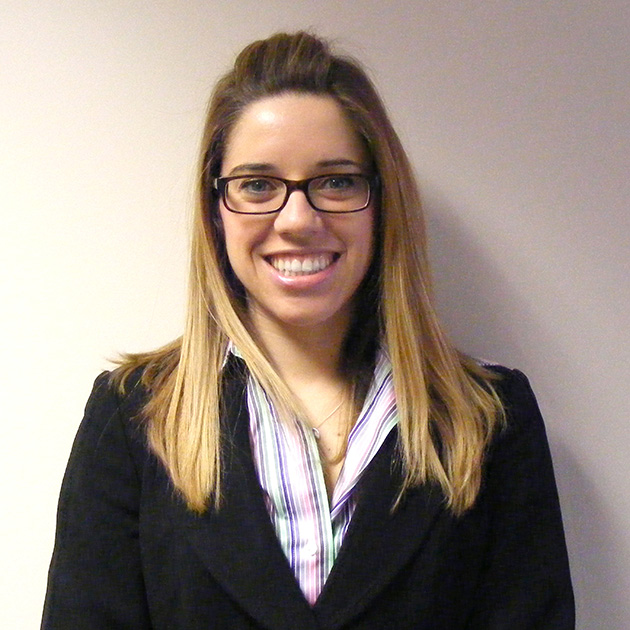 Prior to working for The Outside Clinic, I had been working for an independent practice in South Wales for six years. In 2013 I decided it was time for a change and a new challenge, so I joined The Outside Clinic as a domiciliary optometrist. This turned out to be totally different to what I had expected domiciliary optometry to be.
Prior to working for The Outside Clinic, I had been working for an independent practice in South Wales for six years. In 2013 I decided it was time for a change and a new challenge, so I joined The Outside Clinic as a domiciliary optometrist. This turned out to be totally different to what I had expected domiciliary optometry to be.
I recently visited Bradford University to give a presentation on domiciliary optometry to the BOOSA students. Also I’ve been able to trial The Outside Clinic’s new ‘Combo optician’ role. It gives me the great opportunity to continue enjoying working in the domiciliary sector, which I see as my career choice, yet allows me to take a step back into practice optics without all the hassle or being treated just like ‘a locum’. Plus of course getting back into the swing of testing children and keeping up my contact lens experience.
I recently relocated from London back to Cardiff, and The Outside Clinic were very accommodating. They were also extremely supportive when I represented Wales at the Commonwealth Water Polo Championships in Scotland earlier this year. I work four days a week with weekends free which enables me to have a lovely work/life balance – this is very rare in optometry.
Raman Aggarwal
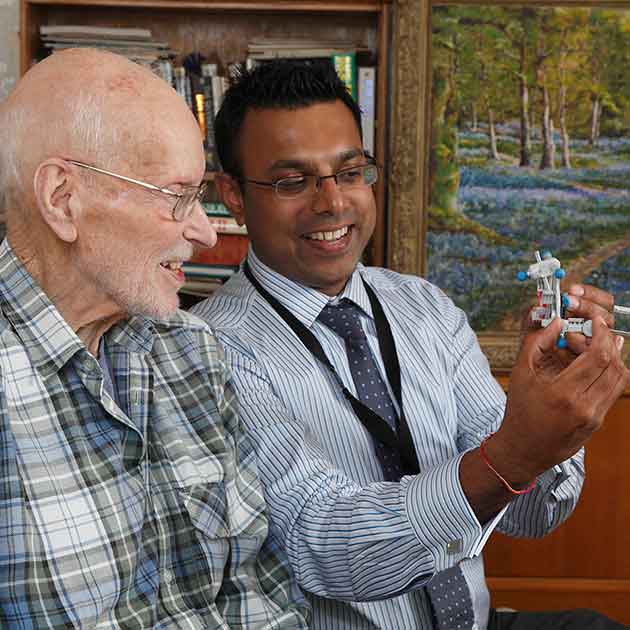 Having previously worked in opticians doing 20 minute testing for almost 10 years, I was looking around for a new challenge. I applied to The Outside Clinic with some trepidation, having never ever done any domiciliary sight tests. And after hearing interesting stories through the grapevine about its challenges, it was a scary proposition.
Having previously worked in opticians doing 20 minute testing for almost 10 years, I was looking around for a new challenge. I applied to The Outside Clinic with some trepidation, having never ever done any domiciliary sight tests. And after hearing interesting stories through the grapevine about its challenges, it was a scary proposition.
After joining, I needn’t have worried. The training and development you get is second to none. You have a national trainer with you for one month for every test, to help you in every facet of your visit to the patient’s house or care home. This support at the start allows you to concentrate on the patient and their needs which is very refreshing. I love the dispensing part of the sight test, as it allows me to follow through my clinical recommendations ranging from spectacles, low vision aids and dry eye products.
I have now been with The Outside Clinic for two and half years and it has been an amazing journey, full of challenges and rewards. I have developed my role in the professional services team, and I became CET lead at the start of the year. We organise roadshows around the country for our colleagues to help pick up CET points and receive up to date information on a wide array of subject articles from AMD, dry eyes, legal and even the dark arts of prism controlled bifocals. These events are very popular and add to the job satisfaction I already get.
We work Monday to Friday which allows me to spend time with my family and friends on the weekend, and being chair of our local LOC, the company has been very supportive and allowed me to attend important meetings and events. If you are thinking about joining The Outside Clinic, don’t think, just apply, you will not regret it.
Matt Burford
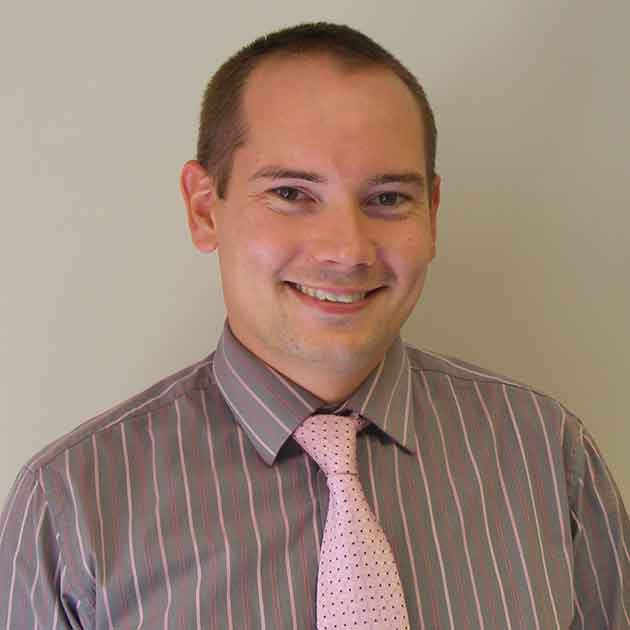 I have been working as a domiciliary optometrist for The Outside Clinic for coming up to ten years. Before I joined the team I hadn’t really considered a career in the domiciliary sector, however since then I haven’t looked back.
I have been working as a domiciliary optometrist for The Outside Clinic for coming up to ten years. Before I joined the team I hadn’t really considered a career in the domiciliary sector, however since then I haven’t looked back.
I find it tremendously rewarding to visit patients who may have been forgotten by society and think that failing eye sight is just part of getting older.
No two days are the same, and through my career progression into the professional services department, I have been able to pass on my experiences to others. As part of my role I assist in administering The Outside Clinic’s exceptional Clinical Governance programme. This helps practitioners develop professionally as well as ensuring that we, as a company, offer a consistently high level of service to the patient. Part of this function includes visiting colleagues out in the field to perform clinical observations as well as conducting clinical record audits. These can then be discussed in greater detail during our frequent head office reviews.
Claire Buck
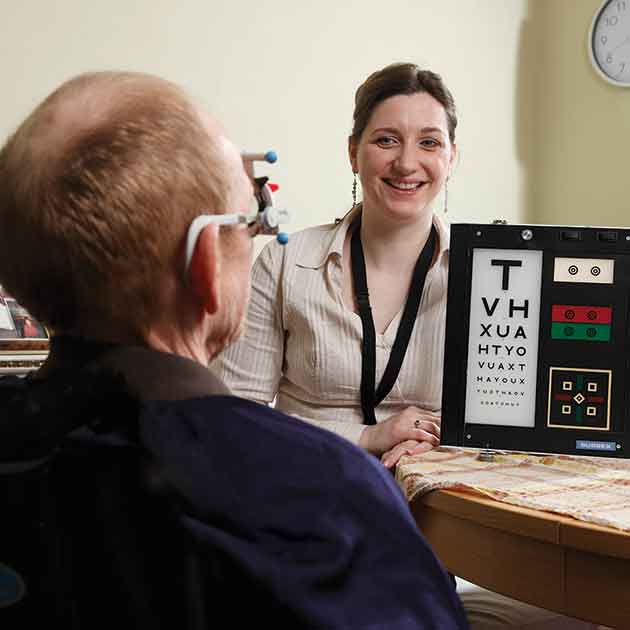 After studying optical management followed by optometry, I knew this was the career for me. I became very passionate about being able to improve people’s vision and detecting eye diseases. However, after seven years working in retail environments, I didn’t feel I was making a ‘real’ difference to people’s lives.
After studying optical management followed by optometry, I knew this was the career for me. I became very passionate about being able to improve people’s vision and detecting eye diseases. However, after seven years working in retail environments, I didn’t feel I was making a ‘real’ difference to people’s lives.
After finding out a lot more about the company, I realised that this is what I trained to be an optometrist for.
Working with elderly and housebound patients and being invited into their homes is a privilege. As they cannot get out I have found much of their time is spent on visually demanding tasks such as reading, crosswords, watching television, one of my patients even fixes watches. Being able to fully assess their working and lighting conditions is extremely important and is a factor that cannot be checked in an opticians testing room. I was able to provide a magnifier to allow a sight impaired patient to see the difference and when she saw a photograph of their great-grandchild she was so pleased. I thought ‘this is why I studied to be an optometrist’.
Working for the Outside Clinic enables me to really provide patients with the help and service they need, and it makes me feel pretty good too.
Aine Fox
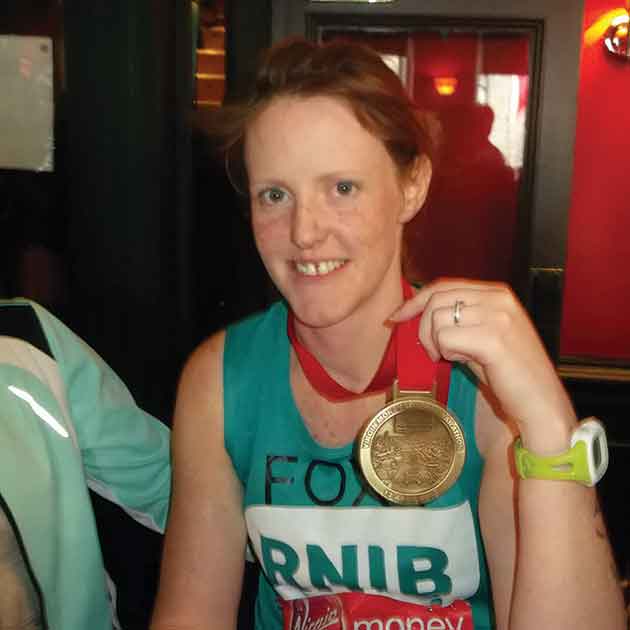 I get asked on a daily basis if I like my job and I usually give the short version ‘yes because every day is different’, but this is only part of the reason. There’s a level of enthusiasm among our staff and a real belief in what we do that I’ve never come across before.
I get asked on a daily basis if I like my job and I usually give the short version ‘yes because every day is different’, but this is only part of the reason. There’s a level of enthusiasm among our staff and a real belief in what we do that I’ve never come across before.
Everyday we go out testing around the country and with the encouragement and support from our professional services team to give 100 per cent to every situation. A line often used by the team is ‘what if we did it a different way’ can we do anything better how can we be better. And this is something that really keeps me motivated how can I be a better optom? This is also something that’s filtered into my personal life how to push myself that little bit harder in different aspects of my life. I ran the London marathon this year and it was something that did not come naturally to me I had to push myself out that door every time but I was never going to get to the finish line without serious training and belief that I could be better that I could do it. The team have also been incredibly supportive helping me to reach by charity goal of £2,500 for the RNIB.
I also can’t talk about domiciliary work and why I love it without talking about the weekends. The difference this makes to my life goes beyond compare.
